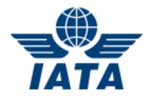An airline trade group has teamed up with Germany’s Deutsche Bank to develop a payment system that would bypass the credit card networks, potentially saving users billions in interchange.
The proposal comes from the International Air Transport Association, which says it has 280 members representing 83% of air traffic. The group lists its headquarters as Montreal but has executive offices in Geneva, Switzerland.
The IATA’s payment project was first reported Sunday by London’s Financial Times. The system is designed for the European market, at least at first. The project is possible because under the new Payment Services Directive 2 regulation taking effect in the European Union, third parties will be able to access certain bank customer data and be able to initiate payments themselves.

A payment transaction would cost the airline “a matter of cents,” an IATA executive quoted by the newspaper said. In contrast, airlines typically pay 1% to 3% of fares for card-acceptance costs, adding up to $8 billion a year, IATA estimated.
An IATA spokesperson did not respond to a Digital Transactions Newsemail requesting comment.
In addition to the groundwork laid for the proposed system by PSD2, the IATA also is benefiting from years of customer-authentication and risk-control techniques developed by the airlines in the Internet age, according to Richard K. Crone of San Carlos, Calif.-based Crone Consulting LLC. A key part of that is the increase in cards on file that the airlines have from customers.
“What makes this possible is a high degree of confidence” in getting a secure payment because “they have a known user,” Crone says.
While details of the how the system will work currently are scanty, Crone likens the apparent payment flow to the so-called memo-posting system used by the Zelle person-to-person payments service in the United States, in which the user’s bank debits funds immediately but doesn’t settle until later in the day through the automated clearing house.
Another airline group that operates a payment system, the Washington, D.C.-based UATP, is skeptical of the IATA plan because of Deutsche Bank’s involvement, though a spokesperson says UATP is not yet fully informed about it.
“Since we are the airline industry’s wholly-owned payment network we expect to be involved in cost-reducing initiatives and would be wary that a commercial bank has the same interest,” the spokesperson tells Digital Transactions News by email.





